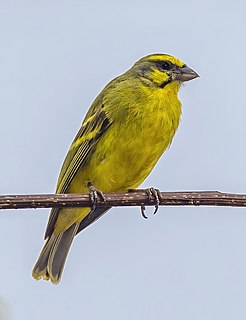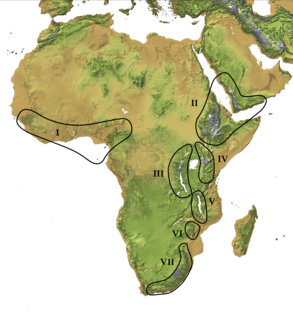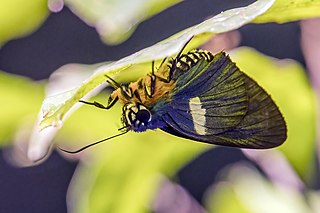
East Africa, Eastern Africa, or East of Africa is the eastern subregion of the African continent. In the United Nations Statistics Division scheme of geographic regions, 10-11-(16*) territories make up Eastern Africa:

The yellow-fronted canary is a small passerine bird in the finch family. It is sometimes known in aviculture as the green singing finch.

Ocimum is a genus of aromatic annual and perennial herbs and shrubs in the family Lamiaceae, native to the tropical and warm temperate regions of all 6 inhabited continents, with the greatest number of species in Africa. It is the genus of basil and the name is from the Ancient Greek word for basil, ὤκιμον. Its best known species are the cooking herb great basil, O. basilicum, and the medicinal herb tulsi, O. tenuiflorum.

Pennisetum is a widespread genus of plants in the grass family, native to tropical and warm temperate regions of the world. They are known commonly as fountaingrasses. Pennisetum is considered a synonym of Cenchrus in Kew's Plants of the World Online.

Tragia is a genus of flowering plants in the spurge family, Euphorbiaceae. It is widespread across North and South America, Africa, the Arabian Peninsula, the Indian Subcontinent, northern Australia, and to various islands in the Caribbean and in the Indian Ocean.

The Afromontane regions are subregions of the Afrotropical realm, one of the Earth's eight biogeographic realms, covering the plant and animal species found in the mountains of Africa and the southern Arabian Peninsula. The Afromontane regions of Africa are discontinuous, separated from each other by lower-lying areas, and are sometimes referred to as the Afromontane archipelago, as their distribution is analogous to a series of sky islands.

Juniperus procera is a coniferous tree native to mountainous areas in Africa and the Arabian Peninsula. It is a characteristic tree of the Afromontane flora.

Meyer's parrot, also known as the brown parrot, is a species of parrot native to Africa. A Meyer's parrot has black feathers, turquoise belly, blue rump, and bright yellow markings on the carpal joint of the wings. Most subspecies have some yellow on the top of the head as well. Forshaw (1989) recognizes six subspecies of P. meyeri which vary in home range, size and in markings, including the extent of yellow markings to the head and wings, and the intensity of turquoise markings on the belly and rump.

The yellow-necked spurfowl or yellow-necked francolin is a species of bird in the family Phasianidae. It is found in Djibouti, Eritrea, Ethiopia, Kenya, Somalia, Sudan, Tanzania, and Uganda. This species is named for the yellow patch found on its neck. Males of this species have been noted to have spurs on the back of their legs.

The rattling cisticola is a species of bird in the family Cisticolidae which is native to Africa south of the equator, and parts of East Africa. It is a common to abundant species in open savanna and scrubland habitats, whether in arid, moist or upland regions. Especially during summer, it is highly conspicuous due to its strident and repetitive call-notes from prominent perches.

The fan-tailed widowbird, also known as the red-shouldered widowbird, is a species of bird in the family Ploceidae, which is native to grassy and swampy areas of the tropical and subtropical Afrotropics.

The double-banded courser, also known as the two-banded courser, is a species of bird in the family Glareolidae.

Trithemis kirbyi, also known as the Kirby's dropwing,orange-winged dropwing, or scarlet rock glider is a species of dragonfly in the family Libellulidae.

Aneilema is a genus of monocotyledonous plants of approximately 60 species. The vast majority of the species are native to sub-Saharan Africa, but a few are found in Oceania and one, Aneilema brasiliense, is from South America. It is the third largest genus in the family Commelinaceae after Commelina and Tradescantia, and it is one of only six genera in the family to occur in both the Eastern Hemisphere and the Western Hemisphere.

Delta is an Old World genus of potter wasps with species predominantly distributed through tropical Africa and Asia. Some species are present in the Palearctic region, and a few have been introduced in the Nearctic and Neotropical regions. The members of this genus have a long metasomal petiole, like members of the genera Eumenes and Zeta.

Eublemma is a genus of moths of the family Erebidae described by Jacob Hübner in 1829.

Urochloa is a genus of plants in the grass family, native to Eurasia, Africa, Australia, Mexico, and the Pacific Islands. Common names include signalgrass.

Sphaeranthus is a genus of Asian, African, and Australian plants in the tribe Inuleae within the family Asteraceae.

Coeliades chalybe, the blue policeman, is a butterfly in the family Hesperiidae. It is found in Senegal, Guinea, Sierra Leone, Liberia, Ivory Coast, Ghana, Togo, Benin, Nigeria, Cameroon, from Equatorial Guinea to Angola and to Ethiopia, Uganda, Kenya and Tanzania. The habitat consists of primary and secondary forests.



















